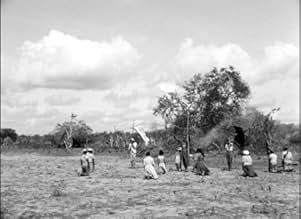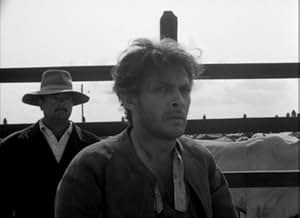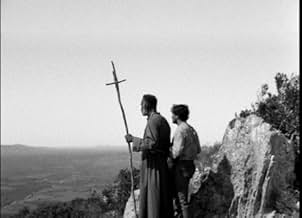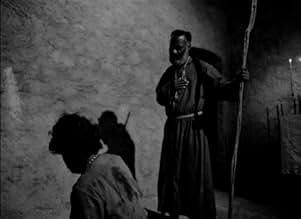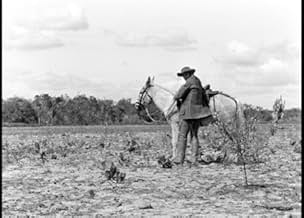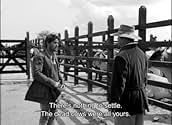CALIFICACIÓN DE IMDb
7.2/10
6 k
TU CALIFICACIÓN
Tras matar a su jefe cuando intenta engañarle para no pagarle, un hombre se convierte en un bandido y comienza a seguir a un santo autoproclamado.Tras matar a su jefe cuando intenta engañarle para no pagarle, un hombre se convierte en un bandido y comienza a seguir a un santo autoproclamado.Tras matar a su jefe cuando intenta engañarle para no pagarle, un hombre se convierte en un bandido y comienza a seguir a un santo autoproclamado.
- Dirección
- Guionistas
- Elenco
- Premios
- 1 nominación en total
Milton Rosa
- Moraes
- (as Milton Roda)
Marrom
- Cego Júlio
- (sin créditos)
- Dirección
- Guionistas
- Todo el elenco y el equipo
- Producción, taquilla y más en IMDbPro
Opiniones destacadas
Deus e o Diabo na Terra do Sol isn't just a good Brazilian movie. This is an actual masterpiece, compared to the big ones in the history of cinema. It's not a boring and too regional film, but deals with universal aspects of human nature, such as blind devotion, love, hate, and all kinds of misery. Glauber Rocha, with only 22 years, made a mix of Eisenstein, Italian neo-realism and nouvelle-vague, under a background of cordel literature (our pulp fictions). The Mauricio do Valle character, Antonio das Mortes, is fundamentally a European western anti-hero, and certainly inspired Leone, Corbucci and others in the development of their scripts. The soundtrack, with Villa Lobbos and Rocha&Ricardo songs, matches perfectly with the dry landscape of the Brazilian Northeast. In short, Deus e o Diabo na Terra do Sol must be known. If you have open mind and like great cinema, and not just the popcorn no-brain north-American blockbusters, try this one.
This movie is so fantastic! I've seen it like 10 times or so, and I still get impressed whenever I watch it. Glauber Rocha, who was a total genius, unites various elements of Brazil's Northeastern culture in a great story about alienation of the people. The story is narrated by a singer who impersonates a regional popular singer; and the visual aspects of the film and the tone of black and white are supposed to resemble the rhymes and the woodcut covers which invoke the "literatura de cordel", or "string literature", which is very common in the northeast of Brazil(not so much today, but certainly in the 60's). The film shows how the powerful control the poorest through violence and intimidation, and how religion and the "Cangaço" movement can be bad when a person without perspective and objectives in life get involved with them. Manuel, the main character, is totally alienated by the "black god" Sebastião, which resembles, in many ways, real Brazilian preacher Antônio Conselheiro; and by the "white devil" Corisco(a real Cangaceiro who worked with real and, in the 20's and 30's, widely famous Cangaço boss Lampião), wonderfully performed by Othon Bastos, while the hired gun Antonio das Mortes is on the look for both Sebastião and Corisco through the badlands of Northeast. This is a real masterpiece!!
This movie is considered by the critics as the most important Brazilian movie of all times. And they are right in this point. An impressive, outstanding portrait of Brazilian rich culture with a focus on some delicate subjects as religion, faith, violence and economic exploration. Rocha made here a fantastic synthesis of the main problems of Brazil, problems that still remained almost forty years after. Great performances by Del Rey and Mauricio do Valle.
Like Karl Marx's Communist Manifesto, Deus e O Diabo Na Terra Do Sol, (translated: God and the Devil in Land of Sun) doesn't bother mincing words when addressing what's wrong with the world. As Communism swept through South America and Cuba in the 50's and 60's, Socialist film-making enjoyed its greatest hey dey and, amongst those films, DeODNTDS is remembered as one of the best. Whereas films like Mikhail Kalatozov's I Am Cuba were unabashed agents of propaganda, bashing Capitalism with a hammer-like heavy hand, Glauber Rocha's efforts were hidden behind the symbolism of one man's Chaucer-esque journey into an unknown fate.
The journey is Manuel's, an impoverished farmer who is radicalized after killing his boss who (like evil capitalists do) attempted to cheat Manuel of his wages. Manuel then finds God, in the form of a self-proclaimed Saint named Sebastian. Before long, Sebastian's blood thirsty spell over Manuel is broken by Rosa, Manuel's dutiful (and long-suffering) wife. But soon after they're free from Sebastian's grip, Manuel is seduced by the charms of a charismatic and similarly blood thirsty bandit named Corisco. Such is the way with Manuel, doomed to follow, and it is this theme that strangles the life out of Rocha's film.
DeODNTDS is a scathing indictment of not only capitalism, but also of religion and society as a whole. In this world, man is desperately out of balance with nature (and thus himself), wishing (and prophesying) for the land to turn to sea and the sea to turn to land. These fruitless dreams are a constant reminder that man must look inward, to find strength from his own heart and hands. The message is unmistakable, as stark as the black and white imagery Rocha bombards us with, but the trouble with DeODNTDS is that it makes it's point early on is compelled to repeat it over and over again, not unlike a mantra.The inevitable fate of Manuel is set up mid-way through the first act, when bounty hunter Antonio das Mortes is hired by church and city officials to kill Saint Sebastian and put an end to his proletariat uprising (which threatens the establishment aka the money making machine). But das Mortes' hunt is sidetracked and ultimately stalled to such a degree that by the time he and Manuel come face to face, no real stakes remain. In the process of pitting these two against one another, Rocha's film gets bogged down in dogmatic digressions that drag out for what feels like an eternity. By the time the credits roll, the momentum of the powerful first act is lost, and instead of challenging its audience's socio-political allegiances, Deus eO Diablo Na Terra Do Sol merely challenges you to stay awake.
The journey is Manuel's, an impoverished farmer who is radicalized after killing his boss who (like evil capitalists do) attempted to cheat Manuel of his wages. Manuel then finds God, in the form of a self-proclaimed Saint named Sebastian. Before long, Sebastian's blood thirsty spell over Manuel is broken by Rosa, Manuel's dutiful (and long-suffering) wife. But soon after they're free from Sebastian's grip, Manuel is seduced by the charms of a charismatic and similarly blood thirsty bandit named Corisco. Such is the way with Manuel, doomed to follow, and it is this theme that strangles the life out of Rocha's film.
DeODNTDS is a scathing indictment of not only capitalism, but also of religion and society as a whole. In this world, man is desperately out of balance with nature (and thus himself), wishing (and prophesying) for the land to turn to sea and the sea to turn to land. These fruitless dreams are a constant reminder that man must look inward, to find strength from his own heart and hands. The message is unmistakable, as stark as the black and white imagery Rocha bombards us with, but the trouble with DeODNTDS is that it makes it's point early on is compelled to repeat it over and over again, not unlike a mantra.The inevitable fate of Manuel is set up mid-way through the first act, when bounty hunter Antonio das Mortes is hired by church and city officials to kill Saint Sebastian and put an end to his proletariat uprising (which threatens the establishment aka the money making machine). But das Mortes' hunt is sidetracked and ultimately stalled to such a degree that by the time he and Manuel come face to face, no real stakes remain. In the process of pitting these two against one another, Rocha's film gets bogged down in dogmatic digressions that drag out for what feels like an eternity. By the time the credits roll, the momentum of the powerful first act is lost, and instead of challenging its audience's socio-political allegiances, Deus eO Diablo Na Terra Do Sol merely challenges you to stay awake.
This film begins wonderfully, brilliantly shot and keenly acted- but right as you're sure it's coming to a close, the music suddenly runs uptempo and the narrator says the equivalent of "Wait, there's more!" and the second segment of the film destroys any credibility the first might have established. The director's portrayal of the desert's harshness lends logically to the lunacy of the characters- but Rosa's actions in the second half seem completely unmotivated, as if the actors ran out of script and just start making things up out of boredom in front of the camera. Laudable attempts at Eisenstein-style multiple-repeat editing are a good idea but using them to cover the low-budget nature of the action scenes is not. Overall worth seeing, but I must warn you that I fell asleep towards the end.
¿Sabías que…?
- TriviaIn the scene where we see Manuel (Geraldo Del Rey) carrying a huge stone over his head while climbing Monte Santo on his knees, Del Rey insisted on carrying a real stone that weighted over 20 kilos - something that really worried director Glauber Rocha. After the shooting, Del Rey had to take 2 days off, as he wasn't in condition to show up.
- ConexionesEdited into A Edição do Nordeste (2023)
- Bandas sonorasManuel e Rosa
Written by Glauber Rocha & Sérgio Ricardo
Selecciones populares
Inicia sesión para calificar y agrega a la lista de videos para obtener recomendaciones personalizadas
- How long is Black God, White Devil?Con tecnología de Alexa
Detalles
- Fecha de lanzamiento
- País de origen
- Sitio oficial
- Idioma
- También se conoce como
- Black God, White Devil
- Locaciones de filmación
- Productoras
- Ver más créditos de la compañía en IMDbPro
Taquilla
- Total en EE. UU. y Canadá
- USD 7,826
- Fin de semana de estreno en EE. UU. y Canadá
- USD 3,200
- 19 nov 2023
- Total a nivel mundial
- USD 7,826
- Tiempo de ejecución2 horas
- Color
- Mezcla de sonido
- Relación de aspecto
- 1.37 : 1
Contribuir a esta página
Sugiere una edición o agrega el contenido que falta


